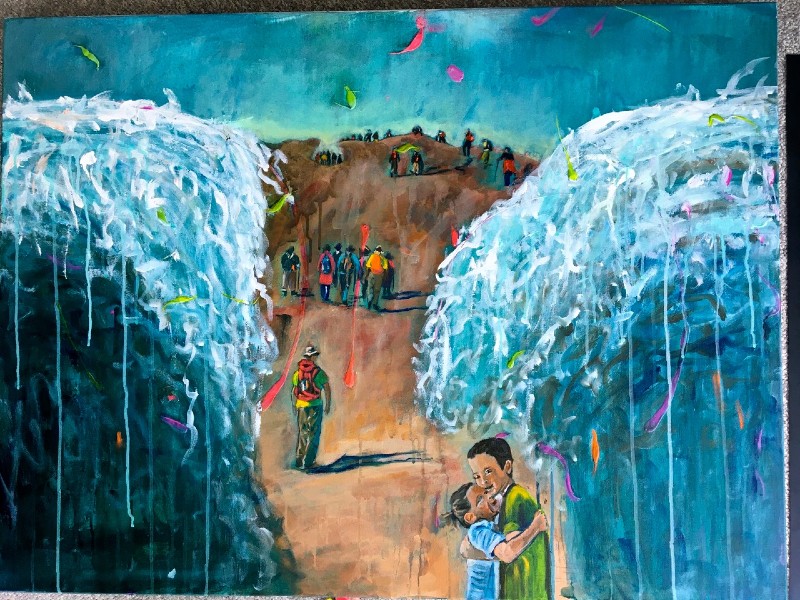Paul and Brenda Hoffert were not happy with the haggadah they had been using because it did not reflect their humanist philosophy and it was not accessible to the large and varied group they had been hosting at family seders for decades.
About 2½ years ago the couple set out to create a new family haggadah that would be humanistic, but still retain the traditional Hebrew songs and prayers. They even commissioned original art work to illustrate their new haggadah.
Their longtime friend, Esther Gelcer, an artist and retired psychologist, created 19 large paintings, which along with the Hoffert haggadah were to have been on display at Congregation Habonim of Toronto.
Having a haggadah that would be inclusive for the whole family was the motivation to create something new, Brenda Hoffert explained in a telephone interview from the couple’s winter home in Florida.
“The story of Passover still has strong meaning for us today.”
Paul Hoffert, a founding member of the rock band Lighthouse and a jazz musician, said he and his wife also wanted a more personalized haggadah. “We thought it would be nice to have something we had written ourselves.
“That was the motivation – to create something just for the family.”
However, he said he discovered that this haggadah project entailed a significant amount of research. “We checked the websites for different rabbinical interpretations of other haggadahs. We downloaded 15 different haggadahs, many with modern innovations.”
When he compared them, each version was different. “We noticed that there is no official order. People do things in different orders.”
The Hofferts also wanted a more feminist haggadah and so they incorporated the feminist symbol of the orange, Brenda Hoffert said, pointing out that an orange emphasizes the importance of women at the seder.
She said it’s a feminist addition which comes from the statement: “There is as much place for a woman at the seder as an orange on the seder plate.”

The new haggadah also has an operatic libretto composed by the Hofferts (Brenda is a lyricist).
They also offer the English transliteration of many of the Hebrew songs and prayers to maximize the participation of everyone in the family, Paul Hoffert said. “We have a diverse crowd.”
In previous years their seders have been large. Between 25 and 35 people have attended their seders, which have also been held at their winter home in Florida as many members of their family are U.S. residents.
Brenda Hoffert said that Gelcer – she lives in Israel part of the year – who is the illustrator of the haggadah, has translated it into Hebrew and made it available in Israel.
The Hofferts said they were thrilled with the art work. Gelcer’s interpretation of the haggadah is more psychological, Brenda Hoffert said.
In an email Gelcer wrote: “Exodus is analogous to the transformational processes that people go through in psychotherapy. The struggle from slavery to freedom represents the process of psychotherapy and personal transformation.
“We are all slaves under the yoke of life’s problems but, once we free ourselves from these, we become masters of our own world. The process, like forty years in the desert, is long and arduous, but once you go through ‘the parting of the sea’ you’re at a point of no return; you are committed.”









